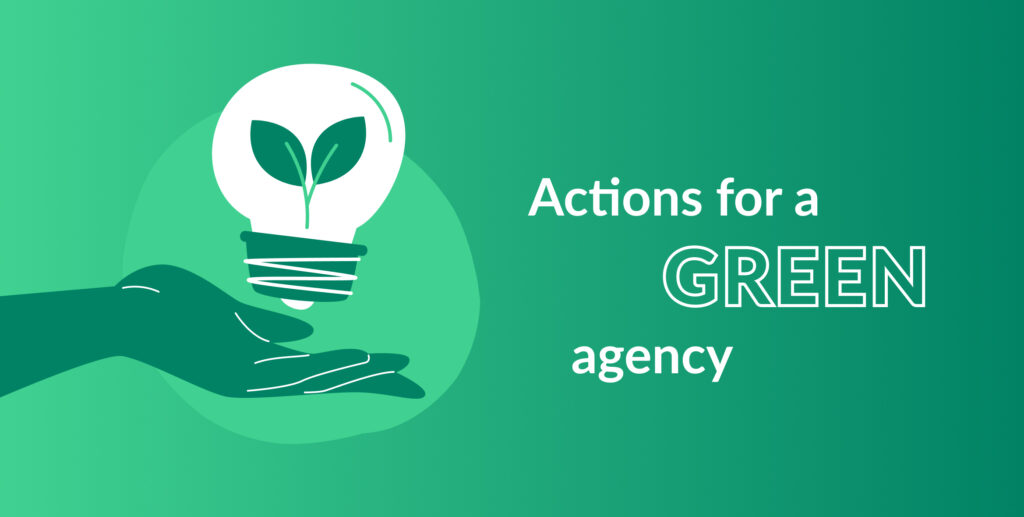Today, sustainability isn’t just a trend – it’s a responsibility, and it’s quickly becoming a key differentiator for brands across all industries. Becoming a green marketing agency can seem difficult due to many having a heavy reliance on digital tools, rapid campaigns, and often fast-paced operations.
However, integrating eco-friendly practices is not only possible but can actually enhance your agency’s brand, attract eco-conscious clients, and foster a positive workplace culture.
From minimizing office waste to optimizing digital practices for energy efficiency, whether you’re a small agency or a larger firm, these actionable steps to becoming a green marketing agency can help reduce your environmental footprint and align your business with the values of today’s conscious consumers.
1. Defining your goals
Perhaps it’s a bit obvious, but there’s little point in implementing new green processes and standards if you don’t have a clear goal in mind. The first step is to figure out where your company currently stands. Where are you now? What initiatives are already in place? And what is your company’s greatest impact?
Start by assessing your current environmental footprint, analysing everything from office energy use and waste production to digital consumption and travel practices. Understanding where your agency stands allows you to identify specific areas where you can become a more green marketing agency.
Once you have a baseline, create well-defined, SMART goals: Specific, Measurable, Achievable, Relevant, and Time-bound. For example, you might aim to reduce paper use by 50% or switch 80% of client websites to eco-friendly hosting within a set timeframe.
Aim to incorporate both short-term and long-term green marketing agency goals: quick wins, like adopting a paperless policy, can show immediate progress, while longer objectives, such as achieving carbon neutrality, keep your team motivated toward a bigger vision.
2. Volunteering days
With goals now in place, it’s time to get into action and out of the office. Company volunteering days are a great way to get your hands dirty and make a difference directly, bringing the team together for a unified cause.
With so many avenues to go down, it can be tricky to know where your time is best spent. Here are a few ways your team can get involved:
Participating in urban green projects
Initiatives such as creating community gardens, green rooftops, and urban green spaces contribute to cleaner air, cooler city environments, and increased biodiversity. They are also a great way to give back to your local community.
Supporting environmental conservation efforts
Volunteering with organisations that focus on reforestation, wetland restoration, or conservation can directly reduce localised carbon dioxide levels and boost your green marketing agency credentials.
Reducing waste through clean-up efforts
A fantastic way to combine team building with environmental impact. Not only does it improve local environments, but it also raises awareness among employees about the importance of waste reduction and sustainability.
For example, earlier this year, Isoline spent a day volunteering at Wimbledon and Putney Commons, picking up litter left behind by the public.

·
3. Go remote!
Since the pandemic, remote working has really taken off, offering a range of green benefits that reduce both individual and organizational carbon footprints. Here are some of the primary ways these work arrangements contribute to environmental sustainability.
1. Reduced Commuting Emissions
- Fewer Car Trips: Remote work minimizes or eliminates the need for commuting, which significantly reduces emissions from vehicles. With fewer employees driving daily, companies can collectively decrease carbon emissions from transportation, one of the largest sources of greenhouse gases.
2. Lower Office Energy Consumption
- Smaller Office Footprint: With fewer employees in the office, there’s an opportunity to downsize spaces and operate more efficiently, reducing energy used for heating, cooling, lighting, and powering office equipment.
3. Less Office Waste and Resource Use
- Reduced Paper and Plastic Waste: Remote work means fewer single-use items, such as coffee cups, printed documents, and meal deal wrappers.
- Lower Water Usage: Offices typically use large amounts of water for kitchens, bathrooms, and maintenance. With fewer people on-site, water consumption and related waste are reduced.
4. Make your website carbon neutral
An easy way to become a green marketing agency is to assess your site’s carbon emissions.
One of the most impactful ways to make your website more sustainable is to use a hosting provider that prioritizes renewable energy. Green web hosts use renewable energy sources to power their data centers and actively offset their carbon emissions. Switching to a green host can make a substantial difference, as traditional data centers are extremely energy-intensive.

The Green Web Foundation offers a great free tool to check whether your website is run on green energy, one of the simplest ways to get started on your journey to making your website carbon neutral.
5. Resource recycling
As technology evolves and devices become obsolete, it can be easy to generate significant amounts of e-waste. A green marketing agency will ensure proper recycling of these devices to mitigate environmental impact. By partnering with certified e-waste recyclers, you can ensure that harmful substances are disposed of safely and that valuable materials are recovered and repurposed.
Donating old laptops to charity is also a highly impactful way to support local communities while promoting sustainability. Giving old laptops to charity provides a win-win-win: it supports education and economic empowerment, reflects positively on your commitment to social and environmental causes, and diverts tech waste from landfills. It’s a simple, powerful way to make a lasting impact on individuals and communities in need and enhance your reputation as a green marketing agency.
Getting started
As sustainability becomes a core expectation for today’s businesses, taking actionable steps to reduce your agency’s environmental impact is more than just good ethics—it’s good business. By setting clear green goals, organizing meaningful volunteering activities, embracing remote work, ensuring your website is carbon neutral, and responsibly recycling resources, your agency can significantly lower its carbon footprint and foster a culture of sustainability.
These initiatives not only align your agency with eco-conscious clients but also motivate your team, creating a workplace where everyone can feel part of a greater positive change. Moving forward with a commitment to these practices ensures that your agency is contributing to environmental stewardship and standing out as a forward-thinking, socially responsible brand.
If you’d like to discuss how Isoline can help you share your green business practices, get in touch at hello@isolinecomms.com



